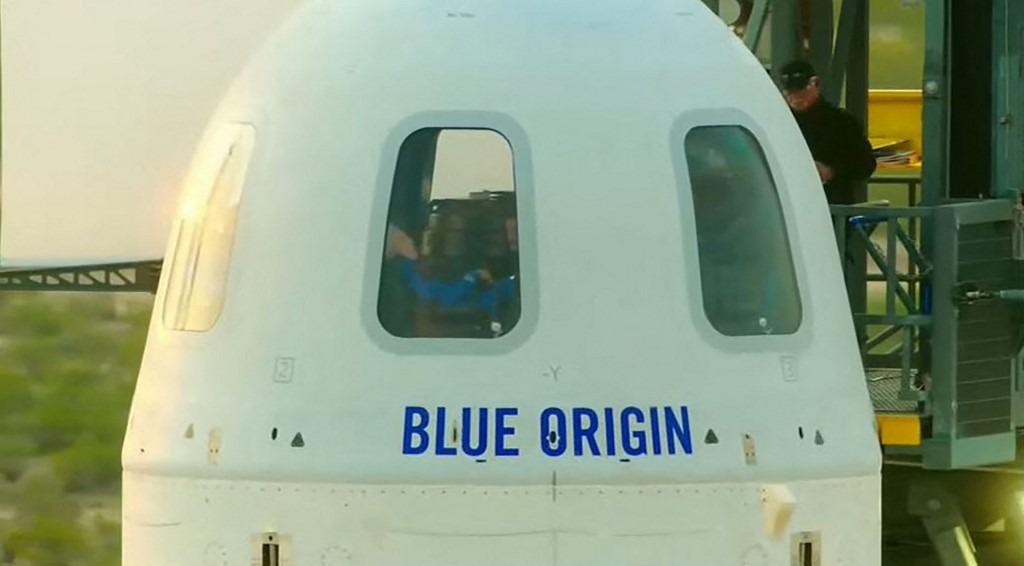 This still image taken from video by Blue Origin shows Mark Bezos, Jeff Bezos, Wally Funk and Oliver Daemen inside the capsule as they travel for the first crewed flight of Blue Origin's reusable New Shepard craft on July 20, 2021 in Van Horn, Texas. (PHOTO / AFP)
This still image taken from video by Blue Origin shows Mark Bezos, Jeff Bezos, Wally Funk and Oliver Daemen inside the capsule as they travel for the first crewed flight of Blue Origin's reusable New Shepard craft on July 20, 2021 in Van Horn, Texas. (PHOTO / AFP)
WASHINGTON - Blue Origin, the aerospace company founded by billionaire Jeff Bezos, expects to break up a corporate partnership formed years ago to build a commercial space station, reassigning staff and changing leadership as it adapts to more urgent priorities, according to several people familiar with the changes.
Earlier this year, the company reassigned a majority of its employees working on Orbital Reef, a commercial space station it had planned to build with Sierra Space, according to three sources familiar with the moves.
The staff went to other programs such as Blue Origin's new moon lander contract with NASA and a closely held in-space mobility project, the sources said.
A Blue Origin spokesperson said Sierra will remain a partner on Orbital Reef but declined to say in what capacity.
The shakeup of the Orbital Reef team shows the rocky state of industry plans to build a private replacement to the two decade-old International Space Station (ISS), the work of multiple government space agencies that has cost more than $100 billion.
Some Blue Origin employees who had worked on Orbital Reef were assigned to a secretive "space mobility" program to develop maneuverable satellites, two sources said
The head of Blue Origin's Advanced Development Programs that oversees Orbital Reef, Brent Sherwood, plans to leave the company by the end of the year, two sources said. The company said Sherwood is retiring.
ALSO READ: Amazon shareholder sues board, Bezos over Blue Origin
The sources spoke on the condition they not be identified as the changes have not been disclosed publicly. CNBC had reported that the partnership was in question, but had no details on the staff reassignments or Sherwood's departure.
Amazon.com founder Bezos, who started Blue Origin in 2000, has been looking to inject a sense of urgency into the company as some important programs face steep hurdles.
Last week, Bezos told Blue Origin employees that longtime Amazon executive Dave Limp would replace Blue Origin's current CEO by year's end.
The company's suborbital tourist rocket, New Shepard, has been grounded for more than a year after a 2022 accident. Delays are also mounting in the development of its bigger rocket, New Glenn, an expected commercial workhorse that will mark Blue Origin's first, long-awaited step into Earth's orbit.
In 2021, Blue Origin announced its partnership to build what it envisions as a "business park in space" with Sierra Space, a spinoff from defense contractor Sierra Nevada Corp. In low Earth orbit, Orbital Reef would function as a microgravity science laboratory for companies and government agencies, and a destination for tourists, among other uses.
ALSO READ: Blue Origin awarded NASA launch contract for Mars mission
A month after the announcement, Sierra announced a series A fundraising worth $1.4 billion. It said a third of that total would fund its contributions to Orbital Reef: an inflatable habitat that formed the livable core of the space station's design.
Recently the partnership has soured, with feuding and disagreement between the companies' managements, three sources said.
A Sierra Space spokesperson declined to comment.
Some Blue Origin employees who had worked on Orbital Reef were assigned to a secretive "space mobility" program to develop maneuverable satellites, two sources said. A job opening posted 25 days ago describes the effort as a "cutting-edge satellite management system, capable of operating a large constellation of vehicles with a small team."
Other employees went to Blue Moon, the company's proposed astronaut moon lander, the sources said. Blue Origin secured $3.4 billion from NASA this year for that lander as part of the agency's Artemis program. Blue Origin said at the time it planned to privately invest "well north" of that amount.
With the aging ISS slated to retire around 2030, NASA is helping fund Orbital Reef and three other early proposals. The agency plans to add more funding for one or two space station proposals in 2026.
ALSO READ: Webb telescope detects water vapor in rocky planet-forming zone
Industry executives have acknowledged that the 2030 deadline is tight. US officials also fear that retiring the ISS with no private station in place could hand China's national space station much of the market for low-Earth orbit research and tourism.
Skeptics worry the orbital market is too small to support four separate privately-built space stations.
Blue Origin, which leads the partnership, is expected to keep working on its own version of a space station without Sierra, two sources said, but it was unclear what those plans look like.
The company has not notified NASA of any changes in the partnership, as its contract would require, a NASA spokesperson said. Reuters could not determine when Blue Origin's commercial contract with Sierra is due to expire.


